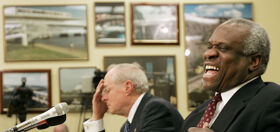
Our previous installments of The Home Issue have revolved around design, interior and aesthetic.
We’re shifting focus today with an interview between our editor and travel writer Mike Luongo. Luongo’s longed to travel since childhood and has traveled around the globe documenting life in Afghanistan, Iraq and Argentina, among many, many others.
The New York-based journalist just edited and released Gay Travels In The Muslim World: an anthology of anecdotes and impressions from and of the Middle East. Though he and Belonsky definitely discuss the book, their conversation veers into religion, the parameters of democratization and the ever-troublesome “other”.
Check it out, after the jump.
Andrew Belonsky: What is home to you?
Mike Luongo: Home can mean many things. Home – I’ve lived here in Manhattan, in Washington Heights, for more than eight years, so that is home. New York will always be my home. I actually grew up in the suburbs. I grew up in New Jersey, but New York will always be my home. Also, because I travel a lot, home is where ever I feel comfortable. Argentina is a home of mine. I’m very comfortable in places like Afghanistan, which I’ve been to a few times. When you visit a place, that can become another form of home. Home really is where I feel comfortable.
AB: You were saying earlier that home is familiarity and feeling at ease. Is that – we were also talking about your father being homophobic, which we’ll get to in a second – when you were in his house, growing up, did you feel at home there? Sure, it was familiar, but is familiarity contingent on comfort?
ML: Well, I mean, my father was very homophobic, but the house that I grew up in was not necessarily a happy home. But, if you’re thinking in the long-term, maybe that made me a sensitive person, a writer. There was often a lack of a sense of comfort and his homophobia was a big part of that.

AB: Do you know where your father’s homophobia came from?
ML: I really don’t know. People could argue that he’s an old rural Italian. His father was from a tiny village in Southern Italy. They have an old world way of thinking. What’s kind of funny is that – we live in a primarily Jewish neighborhood and this woman was sitting shiva and my father wouldn’t go over to say hello, because he thought the whole neighborhood would gossip that he was visiting a widow! That’s a peasant village mentality.
AB: Including his ideals of masculinity?
ML: Yeah, correct.
AB: Explain the evolution of Gay Travels in The Muslim World.
ML: It took a really long time, that book. It took about 18 months to put together and it was a wonderful process. That book – I had done a book called Between The Palms, which was actually a gay travel erotica book and a third of the submissions were either about men who had met men from the Middle East or had actually visited Middle Eastern countries. I was very surprised. There’s a strong curiosity. Also, there’s a lot of homophobic coverage of the Middle East and Muslim countries. Yet you never really saw anybody gay, so I decided that I would do that.

Luongo snapped this shot in an Afghani steam room. Note the classical pose.
AB: You and I have the benefit of living in a Western country – we more or less fit into the spectrum. Your book looks at a lot of countries where men who have sex with men are not spoken about. It happens, but it’s not spoken about because of religion, among other reasons. At the same time that it’s not spoken about – it’s prevalent.
ML: The thing about most Muslim countries in the Middle East – and I’m making a generalization – within the Middle East, men can have sex with men – it’s tolerated, it’s part of the culture – but it’s not described as gay. Gay is a western concept that began to develop during the Victorian period, when we got the word homosexual. We created a gay identity, a gay icon. Within these countries, the concept of gay as we know it [doesn’t exist]. Two men having sex with each other isn’t necessarily a gay thing. Sometimes it’s about power, active and passive. Sometimes it’s about an older man with a younger man, but very often it’s a lack of access to women. People are sexual and when people are intimate with each other in intimate spaces, sex can happen.
AB: The social gendering facilitates man-on-man action.
ML: Yeah.
AB: But it’s not spoken about?
ML: Well, actually, it quite often is.
AB: In what context?
ML: People will bring it up in conversations.
AB: “Me and home boy had sex?”
ML: I can think of many examples in Afghanistan, where people talk about homo-sex. A man will find another man attractive and they’ll want to have sex and they’ll just mention it. This would happen very often in conversations where you would interviewing a political figure and they would talk about someone that they work with that likes to have sex with other men. These things come up in conversation. It surprised me.
AB: So, that seems pretty chill to me: it’s just “I want to have sex with that dude”.
ML: Well, it’s not always like that. As a specific example, I was photographing a very handsome man on the streets of Kabul and these older men, these turbaned men with no teeth – and I’m at a mosque – kept pushing him on to me and were talking about “homo-sex”. Clearly they were trying to negotiate a sexual interaction with me and him: this is on a public street in Kabul at a mosque. It doesn’t really get more public than that. These things happen. I’m not going to say it’s always going to happen that way in a place like Jordan… It really depends on where you are. It can happen.


AB: Do you think it’s better to not have labels?
ML: There was a time when we didn’t have labels.
AB: Yes, well, we do now.
ML: If you talk to older men here in the States – they will lament the fact that they cannot have sex with – for example, here in New York, when the docks used to be lined with workers and men used to go cruise the docks. The men who worked the docks maybe wouldn’t call themselves gay, but didn’t mind having sex with other men. When you begin to define and name the behavior, then they began to question themselves and no longer do that same behavior. Would I say that’s better? It was furtive, which we generally don’t think is good, but it did mean that almost anyone could be available.
AB: So, we’ve come up with these sociosexual prescriptions, which includes masculine behavior, such as what your father believed in.
ML: Well, what is masculine behavior?
AB: What is masculine behavior to you?
ML: Well, even if you said men used to wear wigs and make-up in the 1700’s, but that’s a drag queen now.
AB: Yes, but that’s before the Victorian rationality of sexuality.
ML: Well, only a homo would get their hair done in the 1970’s, but now men can be metrosexual. Everything a metrosexual does can be considered homo behavior. The definition of what is masculine and what is feminine changes. My father was not particularly – he was homophobic – but he loved the opera, he wasn’t particularly athletic. For him it was never about masculine behavior. It was about bringing shame to the family.
AB: Let’s talk about democratization. Where do you draw the line when introducing democracy that could potentially upset a broader national culture? For example, if we went into Iran and we set up a democracy and a gay rights movement sprang up – and it’s never been seen before, the concept didn’t exist – is that –
ML: What you’re getting at – I’ll give you examples from Afghanistan and Iraq. We say that everyone should be able to vote, but how does that fit with traditionalists who think that maybe women should vote, but should be in the home? When you begin to parse out democracy within “traditional cultures” then these very specific questions become problematic. It’s very easy to say everyone should have the right to vote, but democracy goes beyond the right to vote. Some would say, “We want a limited democracy,” but what good is that if you can’t get a job, can’t leave the home?


AB: How much of your work – I saw a quote talking about sexual fantasies –
ML: Are you talking about The Post?
AB: Yeah.
ML: What I wrote as fears, they wrote as fantasies. I was really worried about getting raped at this party I went to – that didn’t happen, but that was my fear. I do have a constant fear of rape, depending on the situation, but –
AB: Only in the Middle East?
ML: Well, you could clearly have that in other places, but – I was at party where no one knew where I was, with fifteen other men, we had a long talk about sex and we were talking also about terrorism and jihad… If something were to happen, who the hell would know. It was a fear of mine, but in the Post’s coverage, they discuss it as a fantasy, but that’s not what it was: it was actually a fear.
AB: Is there any aspect of othering in your book?
ML: It’s very easy for us to view the Middle East or Muslim countries as exotic and as other. The furtive nature of sexuality does make it alluring and exotic. The notion that at anytime someone could be flirting with you, even though it’s forbidden, does create this exotic allure. There’s strong erotic tension within many of these countries, because you can’t necessarily discuss things openly, but it’s always there. It’s always there. I try not to other people, though.
AB: You hear stories of people who go to anti-gay nations, where homosexuality’s very vocally opposed – one of the stories that’s been big is Dick Jefferson, the CBS news man who went to St. Maarten and was attacked. If you go someplace and you know that public displays of affection or being obviously gay are going to create tension – do you think that people should self-censor? Do you think that in traveling, people should adapt to their surroundings?
ML: If your choice is to adapt or death, then, clearly, yes. It’s not just same-sex behavior. There are many types of behavior where you should self-censor. As a traveler or as a tourist, the purpose is not to disrupt the culture that you’re visiting, but to experience it. Probably many gay activists will be upset by me saying this, but even if you go to Texas, you probably shouldn’t hold hands. If you go to Alabama, you probably shouldn’t hold hands. I’m not saying anyone deserves what they get, but you do know what the culture is like. You can find so many different things. Are you there as a traveler there to experience the culture or are you there to be something that sticks out and disrupts the culture?
AB: Do you think it’s possible to strike a balance between that “men have sex with men, but it’s not gay” and what we have in the United States, where you have gay rights organizations. Do you think it’s possible to strike a balance with regard to sexual politics?
ML: I don’t even think that here in the United States we’ve struck a balance with sexual politics. Senator Craig, as an example: we are trying to force him to use the word “gay” to describe himself, because he may or may not have had sex with other men. If he had sex with other men, does that necessarily make him gay. We’re forcing him to label himself, because we force people to label themselves based on their behavior.
How about we take this to the next level?
Our newsletter is like a refreshing cocktail (or mocktail) of LGBTQ+ entertainment and pop culture, served up with a side of eye-candy.



















Jaroslaw
OK Mike – you asked for it! Yes, I’m ticked that you feel one shouldn’t hold hands in Texas. This is the UNITED States or maybe that escaped your thinking. I totally agree that you should be careful and self censor IN ANOTHER COUNTRY. If you want to change that country, move there, become a citizen and work for that change.
I was surprised that the older guys were pushing a handsome guy on you right in front of the Mosque in Kabul. And I do understand the argument about making labels. But guess what? Life is about choices and like it or not, fair or not, one usually has to commit to something eventually. No marriage for Gays for example, keeps us in perpetual adolescence. We don’t have to grow up. I’ll take a mature marriage over some furtive affair with a dock worker who now doesn’t do it because of the “gay” label. If he can’t understand he was still sucking dick or getting his dick sucked by a man because of labels, that proves my point of how shallow it was to begin with.